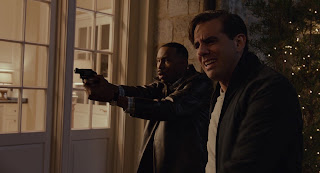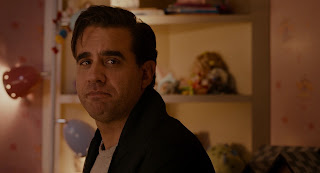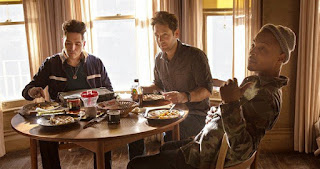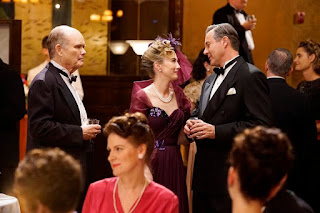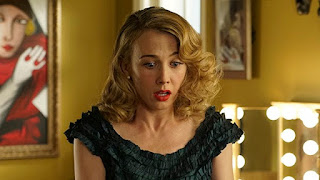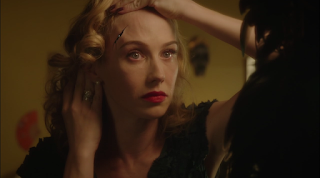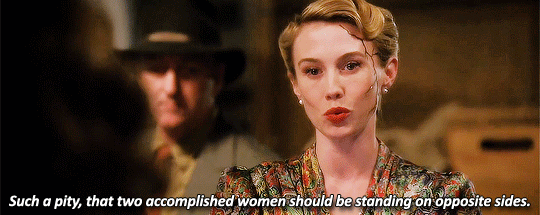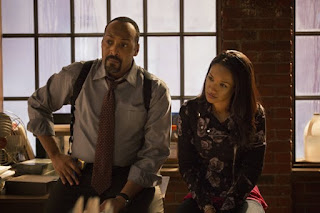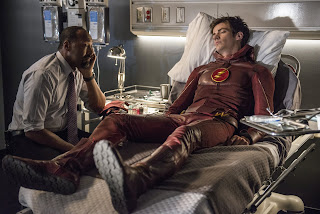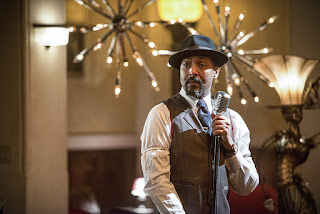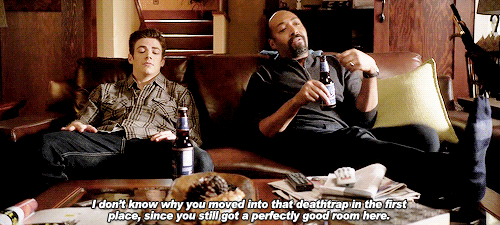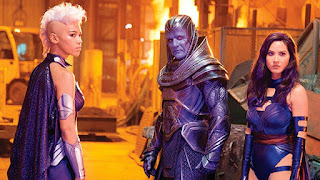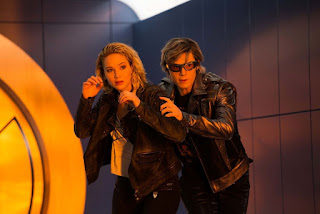I remember how in 2004, when The Prince and Me came out, my heart would flitter-flutter at the idea of a charming European prince like Eddie coming into my life, seeing my nerdy, over-achieving glory, and loving me for exactly who I was. Only unlike Paige Morgan and her weird end-of-movie freakout, I wouldn't run off to finish college. Nope. I would marry my prince and enact social reforms in our charming European country and live happily ever after. When this movie came out, I was all over it. I was sold. Now, however, I'm really not so sure.
See, it's been twelve years now since The Prince and Me graced our theaters, and the world and I have changed a fair bit. I'm no longer the secretly romantic high-schooler dreaming of a happily ever after with some prince - not to say that I've given up on romance, just that my idea of what romance is has changed a lot. Forget last minute racing to the airport to catch the love of your life, I want someone who will love me even when I fart during the dramatic part of a movie. Real love, you know?
But while I have matured in the years since I last swooned over Prince Eddie, the film and its three straight-to-DVD sequels have not. Nope. Upon realizing it was on Netflix and gleefully rewatching this old favorite, I have to conclude that teenage me was, well, kind of an idiot.
This isn't a good love story at all.
In fact I might go so far as to call it awful. For all that it has some mildly progressive moments - the girl being the one to make the grand romantic gesture, having the couple break up for amicable career-related reasons, etc - the general message and tone of the movie is at odds with these inchings towards feminism. For the most part this is a movie about a independent woman who don't need no man realizing that actually she really really does need a man and she needs this man and all of her friends and family who discouraged her from seeking a career other than marriage were stupid and dumb.
Worse, it seems to suggest that being in love is basically the same as having great chemistry. That people fall in love when "sparks collide" and not when they, you know, share some basic interests and can have a conversation that doesn't involve arguing or making out. Paige's own mother goes so far as to sit her daughter down and tell her, "Chemistry isn't just a class, kiddo. And you two have it." Because heaven forbid her only daughter do something irrational like not try to date the guy she can only barely stand but definitely wants to bone.
Okay. I've gotten too far in here, and it's time for the few of you who haven't seen this mess of a movie to catch up. So here's the deal.
Eddie (Luke Mabley) and Paige (Julia Stiles) are worlds apart. Eddie is the crown prince of Denmark, a playboy heir to the throne who takes absolutely nothing seriously and is a terror to his parents. Paige, on the other hand, is a serious, dedicated pre-med student who works so hard she's even in the lab right up until she has to go get changed to be the bridesmaid in her friend's wedding. She's a country girl from rural Wisconsin who dreams of working for Doctors Without Borders. They don't have a lot in common.
But all that changes when Eddie watches a few too many Girls Gone Wild videos (yes, really) and decides to enroll at the University of Wisconsin in the hope of meeting lots of nice MidWestern girls who want to take their tops off. Literally this is the plot. So he takes leave of his royal heritage and goes undercover as "Eddie" instead of Prince Edvard, with only his manservant Soren (Ben Miller) for company.
Naturally our two leads have to meet and be overwhelmed by sexual tension. That's how this works, right? So when Paige and Eddie first clash at the college bar, we are supposed to know immediately that they're meant to be. Even though their first scene together has Paige rightfully dousing Eddie in a high-powered spray of soda. The plot rom-coms along from that meet-cute until Paige succumbs and takes Eddie home for Thanksgiving, giving in to her family and friends' pressure and kissing him. Romance!
The romance naturally can't last, though, because that would be a short movie. So it's only days later that Eddie is outed as the Prince of Denmark. He and Paige break up because he lied to her and then he's recalled to Denmark because plot. Paige quickly realizes that she made a mistake - because she has to talk about Shakespeare and that makes her understand that romance is real and love and kisses and etc - so she races off to the airport to get a plane to Denmark. Her friends even come along and help her pay for the ticket. Cute!
Once in Denmark, the tables turn and now it's about Paige trying to fit into Eddie's world. Paige, who is a strong independent woman who don't need no man (and who just got into Johns Hopkins for med school so she really shouldn't be here), now has to learn how to be royalty. She and Eddie are very shortly engaged, she has to try to bond with her frosty mother-in-law, and she learns how to be a princess. Because Paige and Eddie are meant to be, obviously, she succeeds in all this with only a little bit of charming clumsiness and tomfoolery.

Alas, their happiness cannot last. Despite being destined in the stars and being really good at making out with each other and arguing, Paige and Eddie really don't have anything in common with each other. Like at all. Paige leaves and goes off to med school like she always should have and we're supposed to mourn these star-crossed lovers. How sad that they don't have the rest of their life to be bound together in incredibly public matrimony to keep on arguing and making out and having no other noticeable hallmarks of a healthy relationship.
The end, of course, has us wondering if just maybe these crazy kids can't make it. Eddie, now the King of Denmark, shows up at Paige's college graduation to see if she'll marry him after all. Because they belong together! He doesn't care that she wants to help needy people by being a doctor in developing countries - he loves her anyway!
So, to recap, this is a movie about two people who have absolutely nothing in common falling in love because they're super attracted to each other, breaking up because they have nothing in common twice, and then get back together because despite Paige's protests all she really needs in the world to be complete is a man.
There's a montage in the movie where we see Eddie and Paige having lots of deep conversations, but we don't hear any of them. We literally have no idea what Eddie and Paige see in each other besides the "spark". I mean, we know from a few scenes that because Eddie met Paige and her normal family and peers scrambling to make a living in rural Wisconsin, he's all up on politics now and cares about what happens and is a much better person, but that's not a relationship builder. It's great, don't get me wrong, but it's just one part of their interaction.
Paige, meanwhile, seems to have no logical reason to love Eddie. I mean, yes he's very handsome and I guess he helped her understand Shakespeare, but that does not a life build. What do they have to offer each other besides some kissing in the starlight and a really solid fling? It's not that I hate romance or my soul is dead, I just don't get it. Why are these two people together? As far as I can tell, it's mostly because everyone tells them that they should be.
And if you view it in that lens, this story is basically a horror movie. Just replace the cute soundtrack with some shrieks and ominous tones and what you have is a terrifying tale of a man and a woman almost being trapped in a life neither of them seem to really want just because everyone else thinks it's the right thing.
I mean, remember the structure. We first meet Paige on the day ones of her best friends gets married. She's sitting at a table with one of the other bridesmaids, discussing how she's alarmed by seeing all her ambitious friends fall into marriages of convenience. The looming horror comes when she discovers the woman she's speaking to is also about to get married. Paige is literally the only single person she knows from her friend group.
Then at college, we find that Paige's friends who are funny and sweet are also obsessed with making sure that ambitious, go-getter Paige doesn't go and get. They want her to find a man and "be happy", with the underlying implication that Paige's ambition to go to a great med-school and save lives is lame and a sign she's not really living.
Seriously the whole movie is like this. Paige is a lone voice in the wilderness, daring to suggest that she doesn't need to be married to be happy. But then she meets Eddie and falls for him despite their absolute lack of shared interests. Then she's racing across the ocean and getting engaged that afternoon. She goes from utter disinterest in marriage to planning a wedding in two months.
When Paige comes to her senses and realizes she won't be happy as Eddie's trophy Queen, we should be cheering that the girl in the horror movie decided to go out the front door instead of walking upstairs. It's basically the scene where the heroine finally drives away, mass murderer in the rear-view mirror, panting for breath and sobbing at her close call. The final scene where Eddie comes for her is like the tag at the end of a horror flick where we see the monster isn't dead after all.
Look. It's not that I think marriage is awful or bad or a terrible idea or the worst thing that could possibly happen to someone. It's that I think this marriage is a terrible idea and the worst thing that could happen to Paige and Eddie. I know we're supposed to root for them and think they're perfect for each other, but they're really really not. They're just two skinny, tall, conventionally-attractive white people who dislike each other enough for it to come off as sexual tension.
I'm all for romance, but I like romance that makes sense. Romance where the people involved get each other and support each other and have something else to do in the 95% of their time when they aren't making out. Paige and Eddie don't have that, and heavy-handed metaphors about butterflies in jars aside, their relationship never really makes sense. These aren't two people who should get married and spend the rest of their lives together, these are two people who should catch up on the phone ever year or so and hang out at the ten-year reunion.
I want to get married someday. Probably. But I don't want to get married because I feel like I have to or I'm not living my life right. I don't want to ever fall into the trap of believing that marriage is my only path to a complete life. I already have a complete life. I'm good. I don't need that, and I'd rather wait for a relationship that makes sense for me than jump into one that seems perfect on paper. That's all.
 |
| RUN. |
I'll be the first to admit that the masculinity on display in most of Marvel's Ant-Man isn't exactly exemplary. As presented by Hank Pym and Scott Lang, masculinity seems to be all about imposing your will on the people around you. Hank and Scott might be great superheroes, but they're pretty crappy husbands and fathers, for all that the story seems insistent on putting them on a pedestal and granting them amnesty by way of Hope's forgiveness. On the surface, the masculinity of Ant-Man is pretty freaking bad.
So it should come as some surprise, then, that there's another masculinity lurking underneath, one that is healthy and supportive and good, if not entirely endorsed by the narrative. I'm talking about the masculinity of the minor characters in Ant-Man. Particularly of Paxton (Bobby Cannavale), the man Scott's ex-wife wants to marry, but also of Scott's former cellmate and his partners in crime, Luis (Michael Pena), Kurt (David Dastmalchian), and Dave (T.I.). They might not be main characters, and they might even be slightly maligned by the other characters, but the masculinities that these characters present are, by and large, really healthy.

And that's, well, interesting. It's interesting to see a story where the main male characters are exemplars of white privilege and little else but the supporting ones are pushing back against gender norms. And it's also interesting to think about why these are the characters on the sidelines, why the "other guys" are so often healthier and more compelling than the leads.
Why we're supposed to hate Scott Summers and love Wolverine even though Scott Summers is the one who stuck around to build a life with Jean Grey. Why we're told that guy in the committed relationship standing at the altar isn't as important or manly as the weirdo on rollerskates busting in to "steal" the bride.
Today I want to talk about the other guys.
We'll start with Paxton, a character who gets very little love in Ant-Man but absolutely deserves our respect. So let's set the scene here: imagine that, in the course of your day as a police officer working in the San Francisco Bay Area, you meet this awesome woman. She's funny and smart and has a whipcrack retort to any joke you can think of.
You're totally into her. And then you find out that she's recently divorced and has a toddler at home. Not only that, but her ex-husband is currently in a federal prison because he broke into a multi-national corporation in a misguided Robin Hood attempt.
What do you do? You're a cop, so it's not really your wheelhouse to date the ex-wife of a convict. Also you don't have any children of your own and dating a woman with a little kid is a big commitment. Sure you like this woman, but is she really worth it?
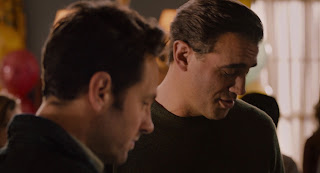 If you're Officer Paxton, then your answer is yes. Absolutely she is. Not only that, but if you're Paxton then you don't just date this woman, you become involved in her life. You love her daughter and you treat her like your own. You parent, with late nights and nightmares and potty breaks and birthday parties. You work at this. You build a life with the woman you love and you ask her to marry you. You love that little girl and you try to raise her right.
If you're Officer Paxton, then your answer is yes. Absolutely she is. Not only that, but if you're Paxton then you don't just date this woman, you become involved in her life. You love her daughter and you treat her like your own. You parent, with late nights and nightmares and potty breaks and birthday parties. You work at this. You build a life with the woman you love and you ask her to marry you. You love that little girl and you try to raise her right.
Then let's imagine that the ex-husband is getting out of jail. You're not worried that your fiancee now is going to go back to him - that ship sailed a long time ago - but you worry about that little girl. How is this man going to fit himself back into your lives? Is he going to try to take her away, take away the child you think of as your own daughter? Is he even going to be safe to be around?
Again, if you're Paxton, you don't deal with this by beating up Scott Lang. You don't yell and scream at him, you don't make a scene, you don't badmouth him to his daughter. You don't invite him to her birthday party, sure, but you don't make a fuss when he does show up. Instead you support your fiancee when she sets good and reasonable boundaries. You worry, but you keep it inside. When your worst fears come true and it seems this guy still hasn't turned from his life of crime, you don't gloat, you don't threaten, you're just disappointed. You really did want Cassie to get to know her father.
Okay, now that scumbag somehow escapes from prison and straight up disappears for weeks. You're terrified the entire time. What if he's coming for Cassie? What if he's going to kidnap her? What if he's a danger to Maggie and you?
And still you don't badmouth him to Cassie. You don't tell her that her daddy is a crook and that she should hate him. You try very hard, in fact, not to turn her against her father. You want to believe the best even as you prepare for the worst. And when the worst finally comes, you're able to step back and let this loser, who is apparently some kind of superhero, save the day. You're even willing to bend a few rules and let him get away afterwards.
Paxton is an awesome guy. Seriously, he is the kind of man we should be holding up and saying, "This! This is what a respectable, decent, honorable adult looks like!" And yet the movie wants us to hate him. Or maybe hate him is too strong. But it certainly wants us to enjoy his misery. We're supposed to cheer when Cassie glowers at him and hopes he doesn't find her probation-skipping felon of a father.
We laugh when he's pulled away from investigating an actual crime that is definitely taking place because the heroes are joyriding in his car. We roll our eyes at how ignorant he is to the larger problems at stake as he is baffled by the tank bursting out the side of a building.
We aren't supposed to like Paxton because we're supposed to like Scott instead. But when you hold these characters up side-by-side, it's no contest whatsoever on who is the better human being.
When Scott goes to Cassie's birthday party and Maggie lays down the law, he doesn't exactly react in the most responsible way. Instead of understanding where she's coming from - that he has never been a father to Cassie and before he can be a part of her life he has to prove he's stable and safe - he decides that he should pull a quick heist and that will solve all his problems. Paxton, meanwhile, is working his job every day, coming home every night. We don't know a huge amount about him, but we can infer from his relationships with Maggie and Cassie that he's a good fiance and father figure. He's responsible. He's there.
And yet, like I said above, we're not supposed to like Paxton. Why? Because Scott is fun. Paxton's not fun, he's all boring and an adult all the time. Scott is fun. He's witty and quippy and he gets into hilarious scrapes. You can bet that Hank Pym never thought about recruiting Paxton to be his expendable fall-guy. Scott is charming and clever and looks good with his shirt off. What else could we possibly want in a male lead?
By contrast, Paxton is kind of lame. He's not particularly funny, he's not quick, he's dependable and solid, which is great in the real world but might as well be a capital offense in the world of movies and television. In other words, Scott is what we're supposed to think healthy, cool masculinity looks like. Paxton is what it actually does look like.
Plus, like I said above, it's not just Paxton. Scott's three criminal friends might be, well, criminals, but they're also interesting cases of non-normative masculinity. Sure it's only bits and pieces, but it's definitely there. Luis, for example, is the kind of guy who brags about stealing two smoothie machines and goes to contemporary art exhibits and wine tastings with his cousins.
Kurt and Dave are silly goobers who talk about Titanic and giggle at each other and never even imply that they would use violence on someone. The three of them might be very minor characters, but they're just developed enough to suggest a rich inner life where posturing masculinity has no place. They're all very comfortable in themselves, and that's worth celebrating.
But really I want to talk about Paxton and Scott here, and why we're supposed to love Scott and tolerate Paxton. Why Scott is the hero and Paxton is the guy who gets in the hero's way. Scott might have a character arc where he "becomes the hero that Cassie always thought he was", but Paxton already was that hero, and it's a damn shame that we're not supposed to acknowledge that.
I guess what it comes out to is a fundamental insecurity on the part of the filmmakers and Scott himself - the idea that Scott Lang can't be a hero and can't be our favorite without us tearing down the only real male competition he has in the film. If the movie admits that Paxton is a great guy with a really good point, then Scott doesn't look so good, and I guess they're not confident that we'll still want to watch Scott become a superhero. Maybe? I think that's it?
All I know is that I am quite frankly sick of the Scott Langs of the world. I'm over the overgrown manchild who doesn't understand the gravity of his situation. I'm over Paul Rudd, who is probably a fantastic actor but has been playing the manchild for so long I'm not sure I believe he can be anything else. I'm over the idea that stable and secure and responsible is boring and should be mocked. I'm just plain over it.
I want a guy like Paxton. That's appealing to me. Sure I want a guy who can make me laugh, but it's a lot more important to me that I find someone who will be a partner to me. Who will sit down while we write out a budget and who will clean the kitchen with me and who will stop at the grocery store to buy more aspirin. I'm not looking for a Scott Lang who is always coming up with crazy schemes. I want boring, because boring means, more often than not, a level of intimacy and commitment that we never see the Scott Langs of the world approach.
Ant-Man is a fun movie, in large part because of Scott's antics. But I think there was room for a better movie here too, one where Scott admits his flaws and the movie doesn't feel the need to drag Paxton down to lift Scott up. Still, even as it is, Ant-Man does give us a picture of what it means to be a committed and loving father and husband. It's just definitely not the main character.
The second season of Agent Carter was not the show at its best - we all kind of know that. For all that there are only two seasons of the show, it's not hard to see that the second season was when the network shoved its hands into the work and tried to make the show more like what they thought people would like. It didn't work and now Agent Carter has been canceled, which sucks.
I could absolutely write an entire article on why the second season was a disappointment - even if I did definitely enjoy elements of it - and how ABC seems to not understand what made Agent Carter popular in the first place, but that's not what today is about. Instead, I want to take this Strong Female Character Friday to talk about the one part of the show that was absolutely perfect: the villain.
So Agent Carter follows the espionage adventures of Agent Peggy Carter from Captain America. It's a show that feels like a bunch of 1940s spy movies all strung together, and it's super fun and clever and occasionally silly. The first season saw Peggy (Hayley Atwell) trying to figure out who framed Howard Stark (Dominic Cooper) for treason all while she battles the entrenched sexism of her job in the SSR.
The second season saw Peggy flying out to Los Angeles, this time on official SSR business, investigating a mysteriously frozen lake and eventually getting caught up in a Nuclear-Age science fiction thriller. It also saw her beset by male love interests, probably the network trying to distract the viewers from the vague homoerotic tension between Peggy and her best friend Angie (Lyndsy Fonseca) in the first season, but that's beside the point.
While the first season made a villain out of shadowy Russian organizations and institutional sexism, the second season points its barb more sharply at the beauty industrial complex and Hollywood in particular. Our villain is both a symbol of this culture and a victim of it, a woman told all her life that her only value is her looks who goes very literally mad because of all the years she was told not to use her brilliant mind.
I'm talking, of course, about Whitney Frost (Wynn Everett). Born Agnes Cully in Dust Bowl Oklahoma, Whitney Frost spent her whole life being told that she couldn't have the life she wanted because she was a woman. She had no power, constrained by her gender but also by poverty and classism. Her mother had to sleep with their landlord to keep the house and always told her daughter to smile because men like to see a pretty face.
Even though Agnes was a brilliant mathematician and scientist, she was rejected from the University of Oklahoma on the basis of her sex. There just wasn't room for a woman as smart as her in the world to use her brains.
It should come as no surprise, then, that when Agnes Cully is approached outside a movie theater in 1934, she is exactly ready to be told to go into modeling and acting, ready to be told to "Smile" and change her name and give up all this ugly physics nonsense. So Agnes Cully becomes Whitney Frost and the greatest mind of her generation goes slowly crazy.
I feel like that should be established. Whitney Frost was more than a little bit unstable before the whole Zero Matter thing happened. It was just the giant ball of goop that pushed her over the edge.
Having been told her entire life that her value was wrapped up in her looks and not her mind, it's not shocking that when Whitney discovers Hollywood is getting ready to pass her by she gets angry. She's worked too hard to become a star and she's not ready for them to tell her she's too old to reap the benefits.
But she's also figured out how to get what she really wants too - through her husband and using him as a shield, Whitney has created a scientific corporation to use her brilliance. It's there that she discovers Zero Matter and her life reaches its seemingly inevitable conclusion.
Really all of this just brings us up to the first episode of season two - we meet Whitney Frost as Peggy becomes involved in the case and starts to suspect that Whitney knows more than she's telling about the mysterious death of a scientist in Isodyne's labs. Slowly we and Peggy learn how much Whitney has been pulling the strings all this time. And it's cool because Peggy, who has spent so much of her life being the only woman in the room, suddenly is facing up against another woman, this one smart and tough and capable like her but with a completely different worldview and value system. It makes for good television.
The basic gist of Whitney's arc in the second season follows her after she's caught in an explosion of Zero Matter and finds that a tiny bit of the matter has embedded itself in the side of her face. At first horrified that her face - her most important asset - has been damaged, Whitney slowly comes under the influence of the Zero Matter and discovers that it is hungry. It wants to eat things. Living things. So she goes around for a while killing people and sucking them into the black scar on her face.
But even that's not enough. Soon Whitney is consumed by her need to get more Zero Matter and more power. She tries to set off a nuclear explosion, kills even more people, and even tries to rip a hole in the fabric of reality. She pushes out everything in her life that isn't her relentless quest for more power, and in the end she has nothing left. It's just her and her fractured mind sitting in front of a mirror at the insane asylum. A pretty unpleasant end.
The unpleasantness of her ending is, however, more based in how tragic her fall really is. I mean, this is a woman who should have been hanging out with Einstein and Oppenheimer but was told she couldn't be smart because she was already pretty, and who learned the hard way that the only way she could get power was by force.
Hell, when Peggy offers to help her and save her from the violent end that Whitney must know is coming, Whitney responds, "Fix me? Why would I want to be fixed? I have never felt more powerful in my entire life!"
And it makes sense. This is a woman who has been disempowered all her life - of course she's going to grasp onto what she sees as her one chance to taste real power. With Zero Matter she can push past all the sexist expectations and the life she's been forced into. With Zero Matter she can be whoever she wants to be. Zero Matter doesn't care if she's a woman, it only cares if she can use her mind to rip open a hole in the universe. Zero Matter doesn't care if she's a movie star, it's just hungry.
The best villains are the ones who you know are wrong and bad and terrible but who you kind of want to win anyway.
Okay, so there are a lot of reasons why Whitney Frost is a pretty logical choice for a Strong Female Character Friday. Obviously she's a complex and interesting female villain whose conflict is firmly rooted in real life sexism, so that's fascinating to start with. But more of her value also lies in how Whitney Frost, as a woman undone by her own intellectual hubris, is a rather unusual figure pop culture.
Victor Frankenstein might have set a precedent for male scientists being undone by their own greatest creations (though he's certainly not the first male figure like that in literature), but our culture is relatively lacking in female characters who go that route. Whitney Frost is in a lot of ways unique - it's rare to see a woman so powerful and smart and damaged that her own brilliance effectively eats her alive. Women are rarely written smart enough for this, but they're also rarely given such powerful stories. As in, stories where they have that much power.
And for all that Whitney Frost's life is very much a story of a woman who lacks power in her life because of her sex, it's also a story about someone who does gain amazing and awe-inspiring power. Whitney Frost is very powerful. She's just also deeply unhinged and dangerous, two more things that women rarely get to be without being also fixated on a man.
In terms of the show itself, the flaws of season two really pale in comparison with its strength. By pitting Peggy Carter against Whitney Frost, the show tells a story about different female responses to institutional sexism. Sure, the rest of the plot got bogged down in love stories and an over-reliance on people's desire to see Edwin Jarvis (James D'Arcy) being British and silly, but the core of the second season was a power-play between two women too often underestimated, and that's great.
It also gets even cooler when you realize that Peggy and Whitney are really mirror images of each other. Peggy might have grown up in an upper-middle class family in the idyllic British countryside while Whitney grew up as the misunderstood poor white trash daughter of a single mother, but they are both women told from the get-go that they shouldn't rely on their minds but rather their pretty faces. Peggy was lucky in that she had a brother pushing her to ignore those voices and strike out on her own anyway. Whitney wasn't nearly as fortunate.
In seeing Peggy and Whitney go head to head, especially given what we've already noted about how Peggy refuses to see other women as competition and rather as potential allies, we get to see two competing views of how to be a smart woman in a world where women aren't supposed to be smart. Peggy has lived her life by throwing herself bodily at the glass ceiling, enduring the bruises and then throwing herself back against it.
Whitney, on the other hand, has preferred to comply on the surface and reap the benefits, all while she still tries to push through behind the scenes. They are two very different strategies, and a lot of the joy of Agent Carter's second season is watching the two women acknowledge this in each other.
I don't look at Whitney Frost and see a character I want to be, not like I do with Peggy. Instead, I look at her and see a character I could be. I see a woman who is so tired of fighting expectations that she just gives in, and I see a woman filled with rage when she finds that giving in to expectations isn't any less exhausting than fighting them. I get Whitney Frost. I wish I didn't, but I do. And I think that as a character, she might just be the best thing to come out of Agent Carter's season two.
So here's to you, Whitney Frost. I'm sorry you went literally mad with power, and I hope that someday we'll get to see a female character who is brilliant and powerful and doesn't get undone by her own creation. But I'll still be grateful for you, the woman who proved you don't have to be a dude to go full Frankenstein and who showed exactly why you shouldn't tell women on the street to "Smile!"
Today's article is a guest post from our recurring writer Trey Stewart.
For all that The Flash is a TV show and comic series about the fastest person alive fighting various bad guys and saving the world, the series is also very much about family. Out of all the DC Comics superheroes, The Flash is somewhat unusual in that his family tree has, canonically, extended for more than a millennium into the future. It's a story that openly explores what it means to be a superhero and still be part of a family.
I bring this up because today we're looking at that family. Specifically, we're talking about Barry Allen's foster father Joe West (Jesse L. Martin) in the recent television adaptation of the story. In this television series, Joe West is both the canonical father of Iris (Candice Patton) and also the adoptive father of Barry Allen (Grant Gustin). But more than just being some sitcom dad or bumbling father figure, the fact that Joe West is their father - and that he's a good father - is an integral part of the show. In fact he’s my favorite character because he embodies several things I want in fictional characters, masculine or otherwise.

The basic gist of the show is this: Barry Allen is a mild-mannered CSI tech working for the same police department as his foster father when a freak accident finds him struck by lightning during the explosion of a particle accelerator. Suddenly gifted with amazing super-speed, Barry decides to use his powers to fight crime and keep his city safe. But using his powers often brings him into conflict with his foster father, Joe, and frequently leaves Barry questioning if this is a secret he's going to be able to keep. Also he's in love with his foster sister, Iris, in a way that is both sweet and a little bit uncomfortable.
Now, given that we are only two seasons into the series, we don’t know that much about Barry’s possible legacy or the future generations of his family. But we do know a bit about Joe’s influence on Barry’s formative years.
The most obvious means by which Joe West has influenced Barry is the fact that Joe is a cop. Not only is Barry Allen a forensic scientist that works for the Central City police department, he is also a guy that cares very much about helping and protecting others. You can see in him how much it mattered to him to see Joe as an example when he was growing up.
Male law enforcement characters in American television are typically an unrealistically violent bunch - mostly aside from the squad on Brooklyn 99. There are quite a few that make me feel scared more than protected. So it's worth noting that not only is Joe West a cop, he is a relatively positive departure from the aggressive male police officer trope.
In the course of the series Joe has only killed two criminals. As a comparison, Jim Gordon and Harvey Bullock from Gotham have killed two to three times as many people over the same number of seasons. Not only is Joe less likely to have fatal encounters with suspects than his counterparts, he is also more self aware about the cynicism that comes from years of being a cop and from looking for reasons to be suspicious of people.
Additionally, Joe West is notable for being an empathetic guy that cares about the people around him. He's an experienced detective with significant professional responsibilities. In his role as a senior detective, Joe West serves as a mentor to Patty Spivot (Shantel VanSanten) in season two. His relationship with Spivot is interesting because it's voluntary. As the head of the CCPD’s “metahuman task force” Joe wasn’t required to work with Patty. But after some convincing, he did so anyway.
Joe’s reluctance to work with Spivot wasn’t at all due to her being a woman. Instead it had more to do with her being inexperienced, Joe wanting to make sure she had the right reasons for wanting to work with him, and with the fact that Joe’s previous partners died in encounters with metahumans.
Once they start working together, their partnership is treated as relatively normal by the narrative and Joe gives her the occasional bit of advice. It’s a natural rather than contrived mentorship. The major exception is that Joe doesn’t tell Patty that he knows and works with The Flash.
This is noteworthy in television. It's almost like Joe West is so fatherly and paternal that he can't turn it off. He finds himself mentoring even when he didn't think he was going to, even when his last partners all passed away in increasingly tragic circumstances. It's an image of the police officer as a trusted advisor and compassionate leader rather than as a man laying down the law. And it's especially noteworthy that Joe West is, well, black.
Before talking about Joe West as a father, I want to take a bit to talk about race as it relates to superheroes and their supporting casts. Around the time that Grant Gustin was announced as playing Barry Allen in The Flash, I remember having an online exchange with someone about how I wished that a person of color had been cast to play Barry Allen. The person responded that Barry Allen is pretty well established as white.
And that's true. Sort of. While it is true that Barry Allen is white, it's incorrect to say that The Flash is white. In fact, there have been several versions of The Flash that have been people of color (not just men). Also, the “a character should be portrayed by an actor of that character’s race/ethnicity” standard is applied inconsistently. Ra’s al Ghul is pretty firmly established as Arab but has yet to be played by an Arab or Arab-American actor. When whitewashing is the issue, purists seem to be less concerned.
So it wouldn't have been out of the realm of possibility to have a non-white Barry Allen or a non-white Flash. But while we have yet to get a person of color playing The Flash, we do have people of color playing both Iris and Wally West (Keiynan Lonsdale). This is significant both because of the importance of people of color being able to see individuals in media that represent them and because none of the negative consequences people seem to fear from adding diversity have come to pass.
In fact, with respect to Joe West, there is the opportunity to tell some really interesting stories. Iris West has always had a father but Joe is a new character created for the Flash TV show. In the pre-New 52 comics, Iris’ birth parents were Eric and Fran Russell. They are from the 30th century and sent Iris back to the 20th century to keep her safe from a nuclear war going on in their own time. Iris’ adopted parents were Ira, a scientist, and Nadine.
While Joe West is an original character, the writers of The Flash did adapt some aspects from the comics into the series. In the show, Barry is the adopted child rather than, so far as we know, Iris. Also, Joe’s late wife and Iris' mother, is Francine West, who shares her given name with Iris’ biological mother from the comics.
This isn't just random information. Legacy is a major theme in the Flash comics and probably will become one in season three and any future seasons of The Flash. Before discussing Joe’s place in a potential Flash legacy, however, it is worth talking about how Joe is kind of the opposite of the stereotypical black father.
Now, it's worth noting before we get into this, that our media stereotypes about black fathers are scientifically very inaccurate. The culture paints a picture of black fatherhood as being absent and harsh, but according to the CDC, black fathers are actually more involved with their children’s lives than are their white and Latino counterparts. Obviously, Joe West fits in with the facts rather than the stereotypes.
In order to get a sense of how awesome Joe is, imagine that your biological father was accused of murdering your mother and that the man who arrested your dad for the crime raised you. You could be forgiven for hating your adoptive father, right? Or you would expect your adoptive father to try to turn you against your biological dad, right?
Instead, by all accounts, Barry loves and admires Joe, the man that arrested his biological father for murder. And similarly, we see that Barry still loves his biological dad too. Joe’s positive example of fatherhood even extends to his “Earth-2” counterpart. On Earth 2, Joe is a singer and his daughter Iris is the one that is a detective. He and his daughter are still close and love each other very much, even if he is suspicious of that world's Barry Allen.
Still, the interesting thing about Joe as a character is that, while he is a good father, he isn’t a perfect father. As is kind of a thing with comic book characters, Joe doesn’t tell his daughter, or his son, that Barry Allen is The Flash. Iris finds out on her own because, unlike some other women in comics, she exhibits the intelligence appropriate for a journalist.
Also, Joe lies to his daughter about her mother being alive. Apparently, Francine had left Joe and Iris after her latest overdose. At the time, lying about Francine being dead was easier for Joe than telling his daughter that her mother was kind of a mess of human being. Notably, during this storyline, the show depicts Iris as justified in being angry with her dad and gives her the time to feel angry before moving on to other plotlines.
But it's important to see that even though Joe lies sometimes or keeps things from his kids, he does it because he cares about them and worries they'll get hurt. And the narrative is able to admit his good intentions while still establishing that what he did was wrong. In other words, it treats him as a human character rather than some dehumanized "perfect dad" or "terrible dad".
Joe’s impact on Iris, Barry, and to a lesser extent Wally can be seen in contrast with the origin of season two villain Zoom. As a child, Zoom saw his dad murder his mother. Rather than be raised by a stable adoptive father, though, Zoom was sent to an orphanage. Even before gaining super-speed, Zoom was a serial killer. By looking at Zoom's history, then, we can see how Barry might have turned out. He didn't in large part because Joe West was there for him.
My favorite part of Joe West’s character, however, in a purely emotional not really thinking about social justice sense, is what his existence means for a possible Flash legacy. Presumably, for the show, the Flash legacy would begin with Iris and Barry.
As I’ve already mentioned, Iris and Barry spent many of their growing up years living in the same house. Thus, in contrast to many superhero couples, Barry and Iris have similar values and life goals. Also they just plain like each other. It makes logical sense that Barry and Iris would wind up married to each other and won’t be just a thing that happens because it is “supposed” to happen.
Assuming that TV Barry and Iris have children, grandchildren, etc, then the show will continue the trend, established in the comics, of the West-Allen family tree being comparatively diverse. I doubt the show will give us a thousand years of Flashes but I’m excited about the prospect of a major family of superheroes made up, largely, of people of color.
Even more than that, though, the idea of Barry and Iris getting married and starting a family and a legacy becomes less about carrying on Barry's legacy and more about Barry and Iris carrying on Joe's. Joe, in this version, is the central figure who inspires this dynasty of superpowered do-gooders, and it's amazing to think of that and think of it all tracing back to an African-American man who was just a really good dad.
In pushing back against stereotypes, it's easy to feel like we have to invent whole new worlds and throw out all the old stuff to make way for new and better stories. But it turns out that sometimes you can radically shift a legacy (and the ideal superhero family) simply by casting a black man to play Joe West.
It feels like such a little thing, but as you can see here, little things are often the ones with the most power.
Joe West isn't a perfect father, but he's still a man worth looking up to. He took in a child who wasn't his own, raised him and loved him, and supported him even when he thought that child was being an idiot. He taught all his kids how to have a stable, good life and how to protect the people around him. He created a legacy not by being the best or having great powers or by saving the world, but by being a good man. That's worth remembering.
Trey Stewart has his PhD in Educational Psychology from the University of Alabama. He recently started his own education research consulting/tutoring business. He wants to be like Joe West when he grows up.
If the past seven X-Men franchise films have taught us anything, it’s that ultimately there are only three characters who matter: Wolverine, Professor X, and Magneto. Anyone else in the series, particularly the female characters and characters of color, is relegated to the background, to a supporting arc and to a minimal if even existent character development. Woohoo.
So it should come as no surprise that, once again, the only characters who matter in the entire world of mutant affairs are Professor X and Magneto. X-Men: Apocalypse might be a fun movie with lots of bright colors and a surprisingly coherent plot, but it’s also a reinforcement of the idea that the only people in this whole world worth paying attention to are the ones we’ve spent fifteen years now following around. I, for one, am ready for a change.
This is not to say that X-Men: Apocalypse is a bad movie, however. It’s certainly no Avengers: Age of Ultron, though it is definitely overstuffed with characters and plot. And it’s not an X-Men: Last Stand either – this is a movie that makes sense at least in the broad strokes and that has just enough plot and emotional investment to let you leave the theater feelings satisfied.
But it’s also definitely not a good movie. It’s rather aggressively mediocre. The daring and challenging plots are ones that the film shies immediately away from, including every possibility that we could get a film not solely about our heroes of manpain. And given that this film introduces a number of compelling and awesome female characters, a lot of acrobatics were required in order to keep our plot squarely centered on Professor X and his metal-bending frenemy.
Before I complain thoroughly, though, let’s give a brief overview of what the movie is actually about. SPOILERS, even if you probably don’t care enough to check for them.
Taking place in the 1980s (and therefore twenty years after the events of X-Men: First Class, meaning that Charles and Erik should be in their fifties), X-Men: Apocalypse starts a look into the history of mutant-kind. Way back in Ancient Egypt*, mutants were worshipped as gods, particularly their leader, En Sabah Nur.
Able to become immortal by switching bodies, En Sabah Nur and his followers are ambushed by their own human guards during a ritual and killed in a collapsing pyramid. Only En Sabah Nur survives, transferred into the body of Oscar Isaac and left in a mystical slumber until the magical pyramid thing can get some sunlight and complete the ritual.
Cut to the 1980s, where Moira MacTaggert (Rose Byrne), intrepid CIA agent, follows a mutant-worshipping cult right to En Sabah Nur's resting place. And because she forgets to close the door behind her, sunlight streams in and wakes the false god, causing a shockwave to go throughout the entire world. Thanks to this inspired piece of writing, literally everything that happens from here on out is because Moira left a door open, a pretty accurate summary of how this movie feels about women.

Meanwhile, all our heroes in their various parts of the globe feel this shockwave and react accordingly. In the case of Professor Charles Xavier (James McAvoy), this means calming down his students and helping a teenaged Jean Grey (Sophie Turner) talk through her apocalyptic vision. For Mystique (Jennifer Lawrence) and Nightcrawler (Kodi Smit-McPhee), they feel it as they flee the illegal mutant-fighting ring where Nightcrawler was kept captive. And for Erik Lensherr (Michael Fassbender), it forces him to reveal his powers and totally wrecks his life.
Since positioning himself as the mutant terrorist threat to the world in X-Men: Days of Future Past, the great Magneto has been hiding in rural Poland, working in a refinery and living a shockingly domestic life. He has a wife, Magda (Carolina Bartczak), and a daughter, Nina (T.J. McGibbon), and they’re all adorable and happy and sweet. So sweet that we know without having to be told that these wonderful characters are going to be fridged for Erik’s manpain before we even get to the first act break.
Lo and behold, that’s exactly what happens. Upon realizing that mild “Henryk” is actually the great Magneto, their neighbors react with suspicion and anger, accidentally killing his wife and child, and Erik responds by just murdering everyone. For En Sabah Nur - now calling himself Apocalypse - who is looking for angry mutant supremacists who he can bend to his will, this is like a perfect moment.
Which is how we get to the main battlelines of the film: Apocalypse and his “four horsemen” versus the X-Men and anyone else they could dig up before the battle. The plot twists and turns a few times, including a detour to the Weapon X program and a completely unnecessary Wolverine cameo, but eventually we get what we all paid for, a battle between good and evil completely destroying the city of Cairo.
Just another story about superhumans beating up other superhumans and leveling a major metropolitan area in the process, right? Well, yes. Like I said above, it’s a very entertaining movie, but not really a good one. All of this plot, the fridging and the manpain and the shoehorned romance, only serves to remind us of why this franchise desperately needs refreshing in the first place. But the glimpses we get, the moments of sheer female awesomeness and surprising plot elements, haunt us with the specter of a much better movie and a much better franchise.
In other words, give me a Mystique movie already.
Okay, so I’m definitely not the first person to point this out, but the X-Men movies really need to up their game when it comes to Jennifer Lawrence. Love her or hate her, you have to admit that in the years since she first signed on to the franchise, Lawrence’s star has risen a lot. She’s gone from a vaguely buzzy indie actress to a genuine movie star, making her ever more reluctant to go back and spend months of her life strapped into a makeup chair getting turned blue just so she can play “concerned female number three” in a series she’s never enjoyed much.
And who can blame her? X-Men: Days of Future Past was the closest we got to a movie actually about Mystique, and that film spent all of its time exploring the motivations of Charles and Erik and Logan. Almost no scenes were shot from Mystique’s perspective, not even the scenes where she was the only character we knew.
So it’s completely understandable that Lawrence seems to be phoning it in during X-Men: Apocalypse, and also understandable from a meta perspective why her “mutant and proud” character spends almost the whole film disguised as a totally normal blonde human woman: I wouldn’t want to spend six hours a day in a makeup chair either if I could help it.
But the problem comes from how much this reluctance to actually give Lawrence something to do hurts the series. After Mystique saved the president in X-Men: Days of Future Past, we are told, she became a hero to the mutant community. Storm (Alexandra Shipp) has a poster of her in the little hovel where she lives. The students at Xavier’s School for the Gifted all look at her with shock and awe.
Mystique is literally the best-known mutant in the entire world, and for some reason she’s walking around as a blonde and living in motel rooms. Why the hell is that not more of a story in this movie?
Even as Erik goes evil and Charles gets kidnapped and Mystique becomes the adult in charge for the bulk of the movie, the film still never really gets on board with her character development. She doesn’t have an arc, unless that arc is “I don’t want to live in Westchester” to “I guess I can live in Westchester”.
She’s just there, being competent and awesome but also inscrutable. Her story has all the hallmarks of an epic superhero tale but none of the depth. I can’t blame Lawrence for wanting to bail on the franchise when you look at what she has to work with. She’s not even the main character in a movie where she’s the only person not brainwashed or taken hostage. That’s got to sting.
On top of this, the other female characters of the film are also competent and compelling and even less prominent in the story. Storm finally gets her canonical backstory of being a streetkid in Cairo, only for that to be quickly tossed aside when she signs up to be an acolyte of the mass-murdering Apocalypse immediately upon meeting him. Psylocke (Oliva Munn) is working as the enforcer for a mutant-smuggler when she signs on with Apocalypse, and yet her entire character can be distilled into her immediate acceptance of Apocalypse's mission and her disgust when he’s defeated.
Jubilee is in the movie so little that she might as well not be there at all, for all that Lana Condor does a fantastic job with the character in the tiny scenes we get, and while Jean Grey gets the closest thing to a plot of any of these women, it’s still a storyline that only covers about five scenes. Total.
 Instead of spending the movie looking at these fantastic and diverse female characters, the movie concerns itself with bland white male characters. Charles and Erik (and Logan) get the bulk of the time, of course, but the film even brings in more bland white boys in case you were confused about who was supposed to be the heroes here.
Instead of spending the movie looking at these fantastic and diverse female characters, the movie concerns itself with bland white male characters. Charles and Erik (and Logan) get the bulk of the time, of course, but the film even brings in more bland white boys in case you were confused about who was supposed to be the heroes here.
Scott Summers (Tye Sheridan) might be a huge character in the comics and in the earlier X-Men movies, but here he’s a mildly angsty teenager with a crush. Yet we spend a lot of the movie on him and his transition to the school and his learning to control his powers. Hank McCoy (Nicholas Hoult) spends a lot of the film in his normal human form – presumably for the same reasons as Lawrence – but gets more development and emotional moments than most of the female characters, even if he still doesn’t have an arc.
But most of all there’s Peter aka Quicksilver (Evan Peters), a character so charming and fun he basically stole the show in X-Men: Days of Future Past. He’s still charming and hilarious here, but his comic relief skills are seriously hampered by the whole “Magneto is my father” storyline. The movie lingers on this plot point, but in the end it means nothing because Peter never tells Erik of his parentage. So we spend a big chunk of the story here on Peter’s conflicted feelings about Erik, only for Peter to wuss out and not tell Erik about any of it. It’s bad storytelling, but it’s also the centering of yet another white male character in a story already rife with them.
And it’s even more frustrating when you consider how the movie actively avoids even hinting at the other big family reveal they could have here. In the comics, Mystique is actually Nightcrawler’s mother, a fact pretty unsurprising when you look at the two of them side-by-side. The timing works in this universe, with the right age difference, the right father figure (Azazel from X-Men: First Class), and the right circumstances all suggesting the link, but it never even comes up.
The problem is that actually Mystique and Nightcrawler have a better relationship and arc than Erik and Peter, but they are the ones who get pushed to the outside of the story. I mean, Mystique tracks down Nightcrawler at a German mutant-fighting ring, saves him, and escorts him personally to the school because he’s what? A stranger? Right.
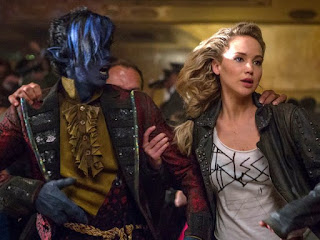 The movie’s refusal to work this into the story, then, comes off as a refusal to work in any significant plot that doesn’t have to do with one of the male leads. Mystique can’t have her own moment in the sun, because that’s “not what the fans are here for”. And that, in addition to being utter crap, is yet another reason why the X-Men movies need a shift in direction. Desperately.
The movie’s refusal to work this into the story, then, comes off as a refusal to work in any significant plot that doesn’t have to do with one of the male leads. Mystique can’t have her own moment in the sun, because that’s “not what the fans are here for”. And that, in addition to being utter crap, is yet another reason why the X-Men movies need a shift in direction. Desperately.
Let’s imagine for a second what the movie could have been. Imagine a version of this same story, without a lot of changes, that focuses on the female characters instead of the blander male ones.
We start with Moira again, but this time we have her working with Storm to get into the cult. Then, when Apocalypse rises and Moira has to flee, Storm is left behind and gets swept up in his power. Instead of spending a ton of time on Magneto, the movie focuses on Storm and Psylocke’s relationships as they try to track down Mystique (obviously the best choice for a horseman, come on). Mystique turns them down because she’s a badass, but that means that she knows what’s going on and goes to warn her brother.
At the school, we spend our time with Jean Grey, living in her shoes as the student body reveres and fears her by turns. We see what it’s like for her to fear what’s inside her and to be terrified of what she could do, but then we get a jolt of awesome when she and Jubilee meet their hero, Mystique, walking into the school one day.
Do you see how much cooler this could be? Plotlines about Mystique trying to figure out how to tell Nightcrawler he’s her son and explain why she abandoned him get even more heartbreaking when Jean accidentally overhears her and has to be sworn to secrecy. The final battle is harder to watch when we know that Moira and Storm know each other and were friends before this. Seeing Mystique embrace her powers encourages Jean to do the same. Storm is genuinely torn at the end over whether she wants to go with Psylocke or Moira…
It’s a good movie, that one, and all we have to do is shift the focus a little bit.
 This isn’t to say that there’s no value in a story about Charles Xavier and Erik Lensherr, for the record. They’re both fascinating characters and I personally love watching them together**. But we’ve already had plenty of movies about their relationship. I mean, five films? I think we can move on now. It’s time to care about some other characters, time to invest elsewhere and tell some other stories. Besides, it would be more in keeping with the spirit of the X-Men series if we did move on now.
This isn’t to say that there’s no value in a story about Charles Xavier and Erik Lensherr, for the record. They’re both fascinating characters and I personally love watching them together**. But we’ve already had plenty of movies about their relationship. I mean, five films? I think we can move on now. It’s time to care about some other characters, time to invest elsewhere and tell some other stories. Besides, it would be more in keeping with the spirit of the X-Men series if we did move on now.
For a story ostensibly based on the Civil Rights movement of the 1960s, the X-Men movies have proved, time and again, that they are really only concerned with the stories of straight white men. In fact, the movies have even gone so far as to erase the elements of those characters stories that deviate from this, minimizing Magneto’s Jewish heritage (this film saw him literally following a false god, for crying out loud) and pushing both Magneto and Professor X into forced heterosexual relationships (I love Moira, but come on). Considering that this series is supposed to be about the outsiders, it does a pretty good job of ignoring that.
So. Should you go see X-Men: Apocalypse? I mean, you can. It’s an entertaining enough movie, rampant sexism and manpain notwithstanding. It’s fun and coherent and you’d probably come out feeling pretty good about the world, but you’re not likely to walk out praising it to the heavens either. It’s really up to you – but I think whether you see it or not, we can agree on one thing for sure: this series needs some serious help.
 |
| #stopshuttingoutstorm |
*Ah yes, Ancient Egypt, the time period of choice for stories that want to incorporate dubious sci-fi tropes into the world. I find it deeply frustrating how these movies gloss over any actual Egyptian history in this and lump it all together into “ancient”. Come on. The span between the building of the Great Pyramid and the time of Cleopatra is greater than the span of time between Cleopatra and us. It’s not like Egypt was a singular culture and civilization for five thousand years. Also, it really wasn’t white.
**I ship it like burning.











